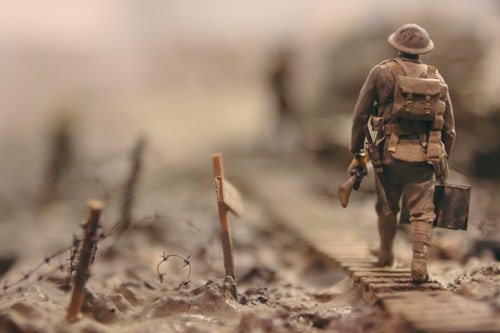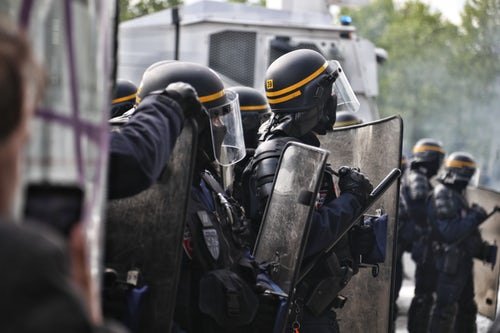"We Happy Few:" Manufactured Brotherhood and Exploiting Familial Feelings
.jpg)
I majored in English literature and, as a result, I was required to read a fair amount of Shakespeare's work. I liked some plays and poems better than others but, as one who mistrusts most authorities, I found that really I enjoyed Henry V and the unintentional irony that can be found in the way that it is misappropriated . If you are unfamiliar with that particular play, it is the one that contains the ever quotable St. Crispin's Day speech. You have likely heard or read excerpts from it and it was almost certainly used in a context that related to the military: "We few, we happy few, we band of brothers; / For he to-day that sheds his blood with me / Shall be my brother [...]" (Shakespeare 4.3 2295-7). Authorities who are trying to stir up patriotism and support for their wars love to use this bit of poetry. The problem is that, both in the context of the play and in real life, these words hide another purpose that serves the interest of the authority. To put it bluntly, the warm and fuzzy feelings that they give us are lies. Henry V, who makes the speech, has self serving motives to keep his men fighting, he does what one might call "market research," and spews propaganda to motivate his soldiers into acting in his own interest. When the war is done, and there is no more "feel good" propaganda keeping things together, the bonds evaporate. In the real, modern, world, a similar tactic is commonly used by authorities for similar reasons. Those who have power over us will often try to cultivate sense of "fraternity" among the populations that they needs to enforce their will (the police, the military, and the like) to encourage subservience and conformity. Simply put, manufactured "brotherhood" can be exploited by the authority to lure people into unquestioning participation in the actions of groups that serve the system of authority, to justify or excuse those actions when they are unethical, and to encourage affected individuals to defend those actions as a matter of familial loyalty.
I would expect that manufactured "brotherhood" was an old trick of the authorities even in Shakespeare's time and it is still commonly used today but that does not mean that all cultivated "familial" feelings are fake. I am certain that many people who serve as soldiers and or work as partners in law enforcement do develop real and lasting bonds. That is undeniable and that is great but it is not a given. Like all human relationships, there is work that must be done and trust that must built before one calls a person "brother" or "sister" (or whatever). Sometimes, people are too different for that to ever happen at all. If someone does not acknowledge this truth and asks us to start viewing people as "family" because they belong to the same group or have the same profession as we do, it is prudent to be suspicious of his or her motives. Shakespeare wasn't dumb. He had caught on to a frequently used line of rhetoric that countless systems of authority have been feeding us throughout our history and I think it would be wise for us to take notice as well.
.jpg)
Making members of groups feel as though they share a deep emotional bond fosters conformity and subservience to the group and the authority that it serves. When a group (let's use the police, as an example) tells its members that they are a "family," it starts to have an effect on the people who hear it. An individual who believes, starts to feel like a member of this new "family" and becomes loyal to it. He or she has a genuine desire to be a part of the "family" and acts for the benefit of the "family" above the the benefit of the self or others. Of course, the sorts of groups that I am referring to are part of the larger system of authority and this places the authority, itself, at the "family's" head. In that sense, loyalty to the "family" is, in practice, loyalty to the authority. An affected individual, has admirable intentions (to help his or her "family") and he or she may have real bonds with his or her "brothers" or "sisters" but the authority exploits those good intentions and positive feelings.

These sorts of "families" sometimes cause their members to ignore or participate in highly unethical actions that are preformed by the group or ordered by its governing authority. The police make a great example of this too. We have seen countless cases where an officer murders an unarmed citizen but is protected from punishment by other law enforcement officials. Justice takes a back seat to loyalty to the "family." It is easy for one to send his or her colleague to prison but it is much harder to to do the same to his or her "brother" or "sister." It does not matter how atrocious the action may be because, by branding its members as "brothers" or "sisters," a group creates a culture that puts a persons natural familial loyalty ahead of ethical soundness. The systems of authority are aware of this phenomenon and they exploit it. They will feed their soldiers or their enforcers (law enforcement) a bunch of "brotherhood" themed rhetoric and if it sinks in, they, as the biggest brother, can ask their little siblings to go out and preform any manner of extremely questionable action (like torturing prisoners, or covering up a murder that was committed by a "brother") in the name of protecting the "family." Again, normally positive feelings, like the love of a sibling, are exploited by the authority for its own purposes.
These cultivated familial bonds make criticizing the actions of the authority or groups which act on its behalf more difficult. This is, perhaps, a side effect of manufactured brotherhood but it still functions to serve the group and the system of authority that it is a part of. Because enough members of the group view each other as "family," they will react emotionally when the group or the authority that it serves is criticized. Essentially, this sort of bond motivates affected individuals to go out and actively argue against criticisms because they take them personally. They defend the system of authority because they believe that they are defending their "family" in the process.
There are ways to resist the effects of manufactured "brotherhood." We could base our relationships with people on merit and trust instead of shared professions. When authority figures tell us that we share a special bond with members of a group, we can question that message. We can try to determine who benefits from the existence of the "family." We can place our ethics above our loyalties (even if that is a painful thing to do, sometimes) and refuse to violate them in the defense of our "brothers" or "sisters." Finally, we can remember that people who we like or are close to are capable of fault and not react emotionally to criticisms of our "family" until we have a good reason to.
Peace.
As an addendum, I want to point out that, while I focused on governmental authorities and the groups that serve them, this same tactic is used by other sorts of authorities for similarly self-serving purposes. Cult leaders make a good examples, as they will often cast themselves as fathers (or mothers) and the members as brothers and sisters. There are other areas where we can also see this type of thing but the goal is often the same. That being the case, most of the points that I made here can be applied elsewhere too.
The play that I quoted from is (obviously) Henry V but if you want to check my line numbers, the specific edition that I used can be found for free here:
https://www.opensourceshakespeare.org/views/plays/play_view.php?WorkID=henry5&Scope=entire&pleasewait=1&msg=pl
All the images in this post are sourced from the free image website, unsplash.com.

It's also an excellent way of recruiting those with a desperate unmet need for those familial bonds; those most incentivised by them.
Shakespeare is good.